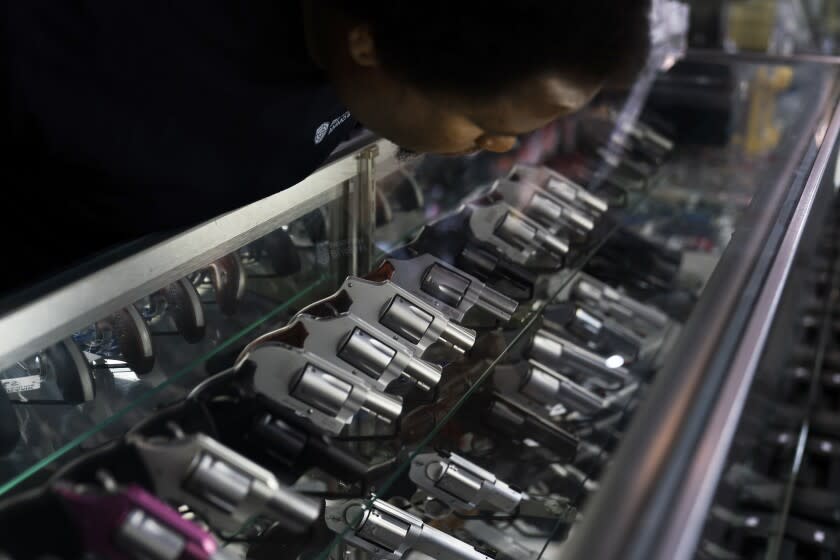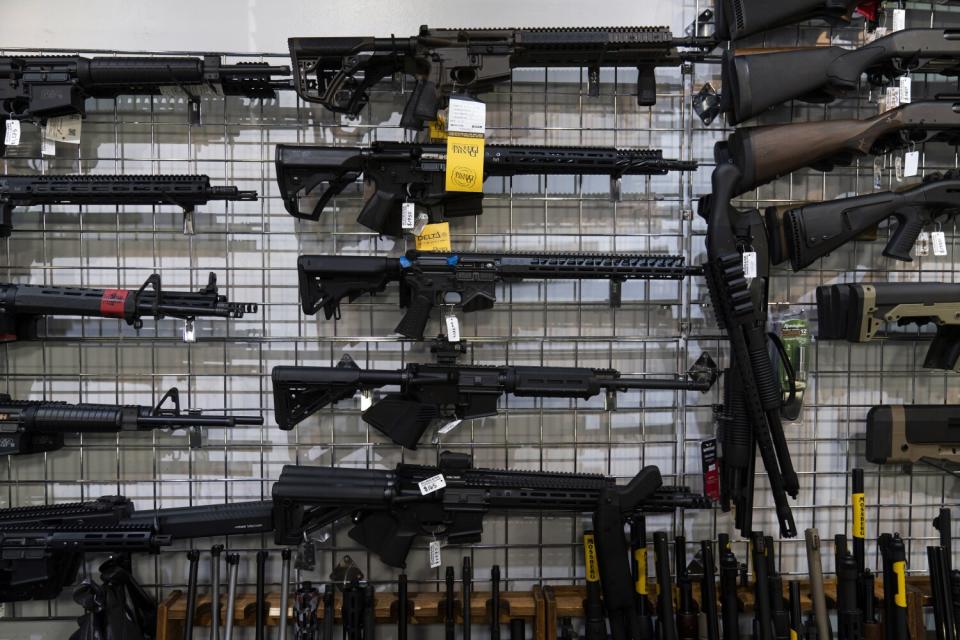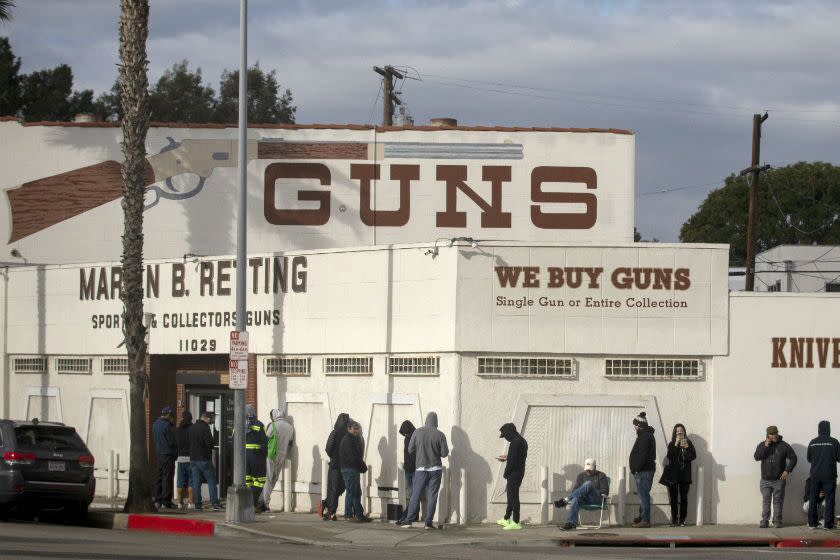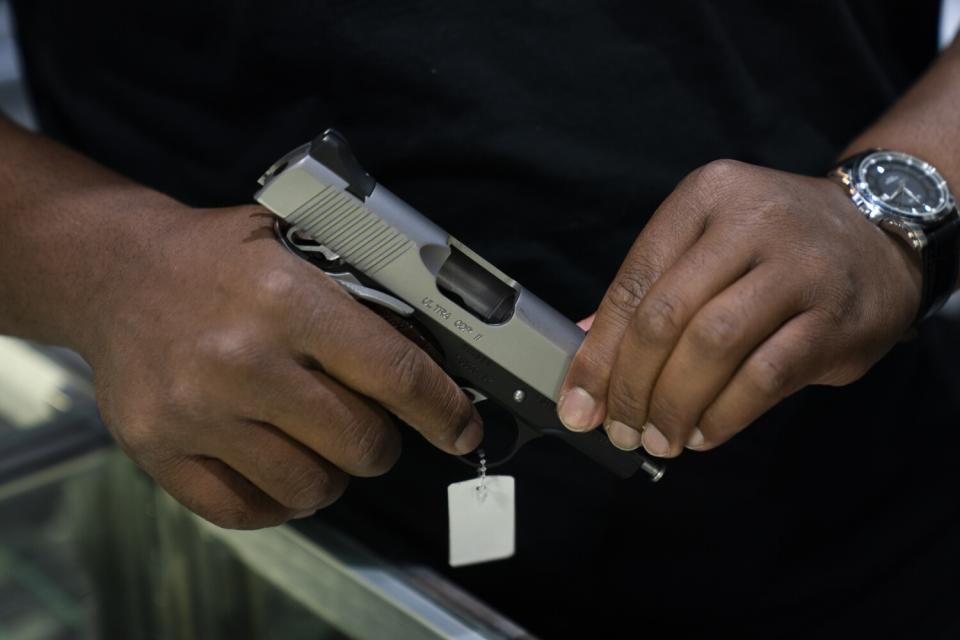War on California gun laws revs up after Supreme Court's 'right to carry' decision

For years, the relationship between Miranda and Richard Wallingford and their Huntington Beach neighbor Jessica Nguyen has been unhappy — if not outright hostile.
According to federal court records, Nguyen didn't like the decades-old melaleuca tree in the Wallingfords' yard. The couple refused to take it down. The tiff between neighbors spiraled into dueling harassment allegations in an Orange County court. In 2019, restraining orders were issued to both parties requiring them to stay away from each other and, under California law, to surrender any firearms they owned.
On Friday, attorneys for the Wallingfords and the state of California dialed into a virtual hearing of the U.S. 9th Circuit Court of Appeals. Each side presented oral arguments about whether the state's restraining order statute violated the couple's 2nd Amendment right to bear arms.
Alexander Frank, an attorney for the Wallingfords, said the lower district court had erred in dismissing the Wallingfords' lawsuit over the statute. He asked the three-judge appeals panel to reverse the decision and allow his clients to amend their original complaint with new arguments based on a monumental pro-gun rights decision by the U.S. Supreme Court last month.
In New York State Rifle & Pistol Association Inc. vs. Bruen, the Supreme Court not only ruled that broad limits against people carrying firearms in states like New York and California were unconstitutional, but that other restrictions on firearms that aren't deeply rooted in early American history — or at least analogous to some historical rule — would likewise violate the 2nd Amendment.
Frank said the Bruen decision bolstered his clients' argument that the California restraining-order law is unconstitutional, and that they deserved the chance to cite it in a new complaint.
"There's really never been a better time" to challenge a gun law as unconstitutional, he said.
He is far from alone in that opinion.
In less than a month, the Bruen decision has reinvigorated an already robust legal war on California's gun laws and forced lower courts to begin reconsidering a whole host of legal challenges — with potentially massive stakes in a country devastated by gun violence on a daily basis.

The cases under new scrutiny deal with some of the most consequential restrictions on firearms in the nation, including the state's bans on military-style weapons, large-capacity magazines and adults under the age of 21 owning semiautomatic rifles. Local closures of gun stores and ranges during COVID-19 lockdowns are also facing fresh scrutiny.
According to legal experts, the spurt of legal wrangling in light of Bruen is unsurprising given the scope of the decision. Justice Clarence Thomas, in writing the opinion of the court's conservative majority, not only overturned the individual New York gun law at issue, the experts said, but rejected a large body of legal precedent — really an entire pillar of judicial analysis in 2nd Amendment law — that traditionally more liberal courts like the 9th Circuit have used to uphold gun laws for years.
"That was clearly one of the goals of the justices in the majority: to shake up 2nd Amendment law and lead to the reconsideration of laws that had previously been upheld," said Adam Winkler, a UCLA law professor who focuses on 2nd Amendment law.
Eugene Volokh, also a UCLA professor who studies the 2nd Amendment, said the Bruen decision was most impactful in that it removed a long-standing "balancing test" that courts have used to assess gun laws for years: whether a law's burden on law-abiding gun owners is outweighed by the public interest.
"That test is no longer part of the argument," Volokh said.
Winkler said Bruen precludes such analysis in favor of a "history and tradition test" that considers restrictive gun laws legitimate only if they have historical roots or are analogous to some historical gun restriction — such as on guns being carried by convicted felons or into specific, "sensitive" areas like courthouses.
In many cases, that's a much harder standard to meet. Though California can readily point to the devastating modern toll of high-powered weapons, laws aimed at tackling comparable historical threats aren't always easy — and are sometimes impossible — to find.
The decision was in many ways a shot across the bow for California officials and residents who have long prided themselves for being a liberal bastion somehow shielded from the edicts of the conservative high court.
State officials, including Gov. Gavin Newsom and Atty. Gen. Rob Bonta, have said they are actively working to understand Bruen's potential implications in California — and to minimize them. State legislators have already passed new laws that they say do not run afoul of the Bruen decision but bolster gun restrictions in the state.
Because of the nature of court proceedings and the complexity of the federal court appeals process, the fallout from Bruen in California — and the possible overturning of state laws — will not be immediate.
However, efforts to dismantle California's gun laws based on Bruen are already underway. The June 23 decision has already been cited in all of the most high-profile California gun cases pending before the 9th Circuit.
In some instances, circuit judges have already kicked the cases back down to the lower district courts to be reconsidered in light of Bruen. In others, litigants have made arguments about Bruen and what it should mean for their cases, or are planning to do so in coming days.
On June 28, a three-judge 9th Circuit panel vacated a lower court's decision that upheld the state's long-standing ban on military-style rifles deemed by the state to be assault weapons. The panel sent the case — Rupp vs. Bonta — back down to the lower court to reconsider in the wake of Bruen.
How the case will be settled remains unclear, but experts said Bruen will make it easier for the plaintiffs to argue the ban is unconstitutional, and therefore more likely the ban could fall.
Circuit judges Andrew D. Hurwitz, an Obama appointee, and Daniel A. Bress, a Trump appointee, agreed to send the case back to the lower court. Judge Patrick J. Bumatay, also a Trump appointee, dissented — arguing in part that sending the case down, only for it to be appealed once more, "may just prolong the inevitable."
"For over a decade, our court has improperly interest-balanced our way around the 2nd Amendment. The Supreme Court has had enough of it," Bumatay said. "With a clear legal standard now in hand, we should have ordered supplemental briefing to further this case along. Instead, we instinctively kick the can back to the district court."
The next day, another 9th Circuit panel remanded a case challenging COVID-19-related closures of gun stores, ammunition shops and firing ranges in the city of Ventura back to the district court for further consideration under Bruen. A case challenging similar closures in Los Angeles County also has been remanded to the lower court.

On June 30, the U.S. Supreme Court said it may consider a case — Duncan vs. Bonta — in which the 9th Circuit had upheld a California law prohibiting people from possessing magazines capable of holding more than 10 rounds of ammunition.
Rather than actually hear the case, however, the Supreme Court immediately remanded it back down to the 9th Circuit to reconsider in light of the Bruen decision.
In another case on the state's ban on military-style weapons — Miller vs. Bonta — the parties have filed dueling arguments as to what effect Bruen should have, if any.
In that case, District Judge Roger T. Benitez, a George W. Bush appointee, overturned California’s 30-year-old ban on military-style weapons, likening an AR-15 semiautomatic to a Swiss Army knife, before a panel of judges on the 9th Circuit placed a hold on the decision.
Now, in light of Bruen, the state is calling for Benitez's ruling to be vacated and for the case to be remanded back to the district court to be reargued. The plaintiffs asked the court to simply affirm Benitez's ruling as in line with Bruen and allow the sale of military-style weapons in California again.
In yet another case — Jones vs. Bonta — a three-judge panel of the 9th Circuit in May reversed a district court in finding that the state’s ban on the sale of semiautomatic rifles to adults younger than 21 was unconstitutional.
Motions for next steps are now pending after the parties filed a joint request for more time to consider the impact of the Supreme Court's June decision.
According to legal experts, the language of Bruen does not bode well for California laws that preclude people from owning guns based purely on public interest arguments. The state, however, still could argue its restrictions are supported by historical tradition or sufficiently tailored such that their burden on gun owners is minimal.
It's a far tighter rope to walk than before Bruen, and legal experts said they will be watching to see which arguments attorneys for California land on as they fight to uphold the state's gun laws.

UCLA's Winkler said Bruen's reliance on a "history and tradition" test is partly why the 9th Circuit has been remanding cases back down to the district courts, where fact-finding occurs in federal cases. The state and challengers to its gun laws will no doubt have to do new research on the history of gun laws in California and nationwide.
"Instead of public policy questions about gun violence and its impact," Winkler said, cases challenging California's gun laws moving forward "will be about history and tradition and the historical nature of gun laws."
During oral arguments in the Wallingford case Friday, Circuit Judge Mark J. Bennett, a Trump appointee, asked California Deputy Atty. Gen. Rita Bosworth what she made of the argument from Frank, the couple's attorney, that Bruen improved the likelihood of success for challenges to gun restrictions and warranted the Wallingfords' being allowed to amend their original complaint.
Bosworth said Bruen was irrelevant to the case, because if the Wallingfords wanted to challenge the terms of a state court's restraining order, they should have done so in state court, not federal court.
"Bruen, pre-Bruen, post-Bruen, whatever," Bosworth said, "this is an issue that should be litigated in state court."
This story originally appeared in Los Angeles Times.

